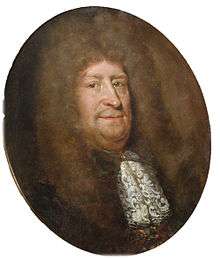Vitus Bering (1617–1675)
Vitus Bering (6 October 1617 – 20 May 1675) was a Danish poet, historian, and Supreme Court justice. He was the great uncle of the explorer Vitus Bering. He served as Historiographer Royal from 1649.
Vitus Bering | |
|---|---|
 Bering painted by Abraham Wuchters | |
| Born | 6 October 1617 |
| Died | 10 May 1675 (aged 57) |
| Nationality | Danish |
Early life and education
Born in Viborg, Bering was the son of the city's mayor Peder Pedersen Bering and Maren Vitusdatter Brun. He graduated from Ciborg Cathedral School in 1635. He attracted attention for his poems in Latin and went abroad on a royal scholarship, visiting the Netherlands and France.
Career
Bering was called home in 1751 to serve as steward for the Scanian magnate Tage Thott's son Ove Thott. In this capacity, he went on a seven year journey to the Netherlands (Leiden 1639), France (Orléans 1640), Italy (Siena 1642, Rome and Padua 1647) and Germany (Strassburg and Basel 1648). After their return to Denmark, he took a Master's degree at Copenhagen University in 1649. He immediately assumed a position as professor poeseos which had apparently been created specially for him. Later that same year he was appointed to professor in history at Sorø Academy and Historiographer Royal. In late 1651, he was granted permission to resign as professor.
His patron, Tage Thott, made arrangements for a residence at Skabersjö Castle in Scania. In 1665, the king granted him the former archbishop's house Lundegård at Lund. The loss of Scania as a result of the Treaty of Roskilde in 1658 made Bering a Swedish subject. With support from Corfitz Ulfeldt, he negotiated with king Carl Gustav for a position as Swedish Historiographer. He offered to describe Sweden's earliest history and declared his willingness to praise the Swedish king's victories in Poland in return for a canonicate in Lund but refused to describe the Swedish victories over Denmark. The king accepted his proposal in 1759 but Bering managed to sell his estate to bishop Vinstrup in Lund in 1660 and chose instead to leave Scania. He was well received in Denmark and became a member of skatkammerkollegiet on 11 November 1660. In 1669, or possibly earlier, he was also appointed to Supreme Court justice. He also kept the position as Historiographer and was also a popular writer of Occasional poetry.[1]
Works
Bering was tasked with writing a general history of Denmark, a work on reign of Christian IV and a work on recent events such as the Assault on Copenhagen in 1659 and the institution of Absolutism in 1660. Neither of these were published prior to his death. His only publication was a critical work on England, Orosij Annilonis dissertalio de bello Dano-Anglico (1667), a defense of the Danish king's policy.
His work on the Assault on Copenhagen, Obsidio Hafniensis, was published posthumously in 1676. His largest work, Floms Danicus, an account of Danish history in Latin, reaching back to 1448, was not published until 1698. Its style is inspired by that of Publius Annius Florus. Historically, it is of little interest, being merely a stylistical treatment of older sources. It was, however, praised in its own time.
Few of Bering's poems have survived. They represent the transition from Bording to Thomas Kingo, who both were among his personal friends, in Danish Baroque poetry.
Personal life

Bering married Anne Nielsdatter, daughter of professor Niels Pedersen Aurilesius, in Church of Our Lady in Copenhagen on 13 June 1652. She died in 1657. On 15 September 1663, he then married Gertrud Jørgensdatter, daughter of renteskriver Jørgen Hansen (1613–73) and Kirstine Knudsdatter (died 1702).
In 1666, Christian V granted him the Klampenborg area north of Copenhagen for life. Bering constructed a small country house on the land and named it Christiansholm after the king. The king also granted him another country estate, probably Farumgård shortly prior to his death in 1675.
His nephew Vitus Jonassen Bering, a sailor, entered Russian service, and, after an unremarkable military career, made himself a name as an explorer, commanding the First Kamchatka Expedition and Great Northern Expedition, where he perished at 60 years of age. Their similar names and the lack of the latter man's reliable portraits has led to the lot of confusion, and, until the explorer's remains were rediscovered in 1991, the portrait of his uncle was believed to belong to him.
References
- "Vitus Bering" (in Danish). Dansk Biografisk Leksikon. Retrieved 18 September 2016.